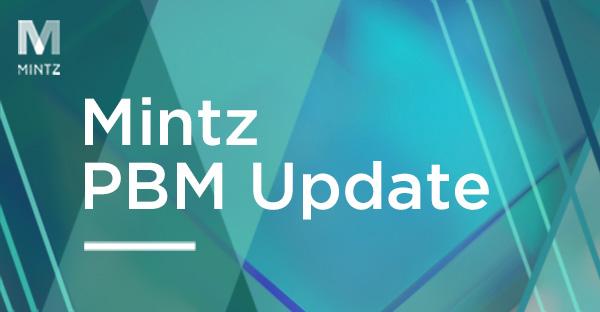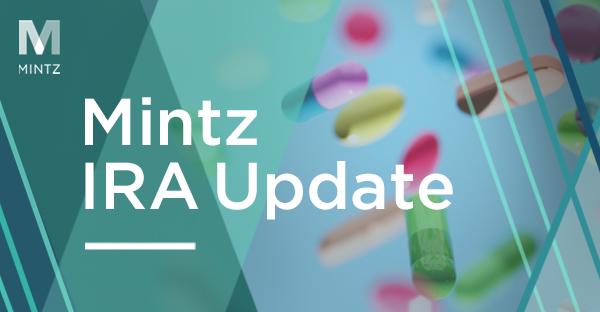
Health Care
Viewpoints
Filter by:
Will Sustained Pressure on the 340B Program Finally Lead to Much Needed Reform?
September 17, 2024 | Blog | By Abdie Santiago, Pat Ouellette
As we enter into the final months of 2024, new developments in the administration of the 340B Drug Pricing Program signal that additional reform may be on the way. Although recent revisions to the 340B program’s administrative dispute resolution (ADR) process represented a positive development in program reform, many questions remain as to how the Health Resources and Services Administration (HRSA) along with Congress may resolve stakeholder concerns with the drug pricing program’s future.
Texas Challenges HHS’s HIPAA Rule Protecting Reproductive Health Information from State Investigative Bodies
September 12, 2024 | Blog | By Cassandra Paolillo, Madison Castle
Last week, Texas Attorney General Ken Paxton filed a complaint in federal district court against HHS and the Office for Civil Rights (OCR) challenging a recently issued rule strengthening protection of protected health information (PHI) related to reproductive health. As summarized in a previous post, the HIPAA Privacy Rule to Support Reproductive Health Care Privacy (Final Rule), generally prohibits disclosure or use of PHI by a covered entity or their business associate for purposes of criminal, civil, or administrative investigations into persons for seeking, obtaining, providing, or facilitating reproductive health care under lawful circumstances. In its complaint, Texas argues that the Final Rule is unlawful and seeks to have it vacated.
California’s Health Care Transactions Review Law: Regulatory Revisions Effective Immediately
August 26, 2024 | Blog | By Kathryn Edgerton, Deborah Daccord, Stephnie John, Pamela Polevoy
Effective immediately, on August 22, 2024, the Office of Health Care Affordability (OHCA) adopted revisions to the cost and market impact review (CMIR) regulations (Revised Regulations), which govern California’s pre-closing health care transaction review process. As discussed in our prior post, certain health care entities must provide OHCA with notice of a transaction at least 90 days prior to closing. The Revised Regulations, among other things: (1) expand who must file a notice; (2) narrow the applicability of the health care professional shortage area threshold; (3) clarify calculation of California-derived revenue; (4) clarify confidentiality of expedited review request documents; and (5) add a required attestation.
CMS 2026 IRA Price Negotiations Results Likely to Create Upstream and Downstream Effects
August 20, 2024 | Blog | By Rachel A. Alexander, Theresa Carnegie, Xavier Hardy, Alison H. Peters, Madison Castle
On August 15, 2024, CMS announced the results of the first round of the negotiated prices between CMS and participating drug manufacturers for the 10 selected drugs under the Inflation Reduction Act’s (IRA) Medicare Drug Price Negotiation Program (MPN or Program). In all, reactions to the MPN results varied: Reuters reported that executives from four of the manufacturers selected in the first round of negotiations stated that they do not expect the negotiated prices to significantly impact their businesses; meanwhile, in its press release announcing the maximum fair prices (MFPs), CMS touted an estimated $1.5 billion in Medicare prescription drug out-of-pocket cost savings for Medicare beneficiaries when the negotiated prices go into effect in 2026.
CMS Issues Final Notice on Program for Breakthrough Device Reimbursement but Industry Looks to Congress for More Inclusive Solution
August 19, 2024 | Blog | By Benjamin Zegarelli, Joanne Hawana , Anthony DeMaio, Pamela Mejia
Obtaining Medicare coverage and reimbursement for medical devices is notoriously more difficult than for drugs or biologics, and any progress on expanding coverage pathways has been agonizingly slow for industry stakeholders. An announcement on August 7, 2024 by the Centers for Medicare and Medicaid Services (CMS) of a final notice for the Transitional Coverage for Emerging Technologies (TCET) pathway was therefore a welcome development. However, digging under the surface of the TCET pathway uncovers some less than thrilling details. CMS’s failure to address stakeholder proposals to modify the TCET program has increased interest and advocacy around Congress’s consideration of the Ensuring Patient Access to Critical Breakthrough Products Act. We explore both the shortcomings of the TCET pathway and the possible legislative solutions to its perceived gaps below.
FDA Rolls Out Innovative New Designation Programs in Response to Congressional Mandates
August 15, 2024 | Blog | By Joanne Hawana
Many life sciences stakeholders are familiar with “traditional” designation programs operated by the Food and Drug Administration (FDA) in exercising its medical product authorities, such as the orphan drug designation and breakthrough therapy/breakthrough device designation programs. These designation programs follow a typical paradigm – (1) a product developer demonstrates to FDA that its candidate meets certain qualifying criteria; (2) FDA grants the relevant designation to the product candidate in question; and (3) the product developer then benefits from an increased frequency of interactions with the agency during continued development of the product and/or a valuable advantage that’s secured upon the product’s future marketing authorization (e.g., orphan exclusivity or a priority review voucher).
DOJ Files False Claims Act Suit against Public Health System Alleging Widespread Stark Law Violations for Excessive Physician Compensation
August 13, 2024 | Blog | By Laurence Freedman, Rachel Yount
The Department of Justice (DOJ) recently filed a complaint against Erlanger Health System (Erlanger), a county-owned public health system, and two of its Tennessee hospitals alleging that the health system systemically violated the Stark Law from 2014-2021 and “knowingly” submitted claims for hospital procedures in violation of the False Claims Act. The lawsuit was initially brought as a qui tam (whistleblower) lawsuit filed by a former Chief Compliance Officer and a former Chief Financial Officer of Erlanger. While fair market value compensation is a key criterion for most Stark Law exceptions, this lawsuit is one of the few enforcement actions initiated by the DOJ focused on fair market value compensation paid to employed physicians. This blog post covers three key takeaways from the DOJ’s allegations against Erlanger.
PBM Policy and Legislative Update — Summer 2024
July 31, 2024 | Blog | By Theresa Carnegie, Tara E. Dwyer, Rachel A. Alexander, Bridgette Keller, Madison Castle, David Gilboa, Xavier Hardy, Samantha Hawkins, Stephnie John, Pat Ouellette, Alison H. Peters, Abdie Santiago, Hassan Shaikh, Sophia Temis
FDA Issues Guidance Intended to Diversify and Enhance Clinical Trial Participation
July 29, 2024 | Blog | By Pamela Mejia, Jean D. Mancheno
On June 28, 2024, the Food and Drug Administration (FDA) released draft guidance for industry, titled Diversity Action Plans to Improve Enrollment of Participants from Underrepresented Populations in Clinical Studies (the Draft Guidance), for public review and comment. The Draft Guidance was issued pursuant to a directive from Congress in the Food and Drug Omnibus Reform Act (FDORA), signed into law in December 2022, which required FDA to issue or update guidance on diversity action plans that sponsors submit for certain clinical studies of investigational drugs and medical devices. The Draft Guidance also serves to update guidance that FDA previously issued on the topic in April 2022.
The OIG Issues New FAQs on Financial Assistance Policies and Marketing to Patients
July 18, 2024 | Blog | By Rachel Yount, Madison Castle
On July 8, 2024, the Office of Inspector General (OIG) updated its General Questions on Fraud and Abuse Authorities (FAQs) related to the Anti-Kickback Statute (AKS) and the Beneficiary Inducement Prohibition of Civil Monetary Penalties Law (CMPL) with clarifications regarding waiving patients’ cost-sharing amounts pursuant to health care providers’ financial assistance policies. The new FAQs (FAQs #13-16) reiterate the OIG’s longstanding position that hospitals and other health care providers may provide financial assistance to Medicare and Medicaid beneficiaries on the basis of financial need. Of note, the OIG also provides some guidance on the distinction between marketing and advertising to patients as opposed to making patients aware about the availability of financial assistance, and this guidance may be useful in a variety of contexts beyond cost-sharing waivers.
Mintz IRA Update — Learning From Experience: Medicare Drug Price Negotiation Program Updates
July 15, 2024 | Blog | By Stephnie John, Samantha Hawkins, Madison Castle
Mintz IRA Update — Opposition to the Use of March-In Rights to Lower Drug Prices
July 15, 2024 | Blog | By Stephnie John
Mintz IRA Update — IRA Litigation Update: Courts Begin to Address Legal Challenges to the Medicare Drug Price Negotiation Program
July 15, 2024 | Blog | By Xavier Hardy, Mitchell Clough
Mintz IRA Update — The Growing Use of State Prescription Drug Affordability Boards
July 15, 2024 | Blog | By Madison Castle
Mintz IRA Update — Third Edition: Q2 2024
July 15, 2024 | Blog | By Rachel A. Alexander, Theresa Carnegie, Madison Castle, Mitchell Clough, Tara E. Dwyer, David Gilboa, Xavier Hardy, Samantha Hawkins, Stephnie John, Bridgette Keller, Lauren Moldawer, Abdie Santiago, Hassan Shaikh
In ‘Third Edition: Q2 2024’ of the Mintz IRA Update, we cover updates to the Medicare Drug Price Negotiation Program being considered by CMS, developments in litigation challenging the program, the consequences and costs of redesigning the Part D program, opposition to the use of march-in rights to lower drug prices, and the growing use of state prescription drug affordability boards.
Mintz IRA Update — The Consequences and Costs of Redesigning the Part D Program
July 15, 2024 | Blog | By Tara E. Dwyer, Lauren Moldawer, David Gilboa, Samantha Hawkins, Stephnie John, Matthew Tikhonovsky
Read about the 2025 redesign of the Medicare Part D program pursuant to the Inflation Reduction Act of 2022 and how those changes impact Medicare Part D plan sponsors, beneficiaries, and manufacturers.
The Uncertain Landscape of Medicare Agent/Broker Compensation Rules
July 11, 2024 | Blog | By Tara E. Dwyer, Xavier Hardy, Madison Castle
In the Proposed Medicare Advantage and Part D Rules for 2025, the Centers for Medicare & Medicaid Services (CMS) proposed significant changes to how Medicare Advantage organizations (MAOs) are allowed to contract with and compensate entities that provide agent/broker and enrollment services. The proposed rules were heavily disfavored by entities that provide such services, but were not widely commented on by MAOs or Part D sponsors (PDP Sponsors), which are the entities to which the rules actually apply.
Five Observations from FDA’s Responses to Comments in the Final Rule on LDTs
July 10, 2024 | Blog | By Benjamin Zegarelli
Now that the final rule on laboratory developed tests (LDTs) has been available for over a month and the stages of the enforcement discretion phaseout process and the Food and Drug Administration’s (FDA’s) newly proposed policies for continuing limited enforcement discretion for certain types of LDTs have been thoroughly described and dissected (including by us in our previous post), it’s high time to dig into FDA’s perspectives on the comments it received on the proposed rule.
Petition for Certiorari Filed in Supreme Court in False Claims Act Case Seeking Review of Whether “Willful” Under the Anti-Kickback Statute Requires Knowledge that the Conduct is Unlawful
July 8, 2024 | Blog | By Laurence Freedman, Laura E. Martin
The Supreme Court now has the opportunity to define “willfulness” under the federal criminal Anti-Kickback Statute (AKS). In a declined qui tam case filed against McKesson Corporation, a pharmaceutical wholesaler, the relator, Adam Hart, a former McKesson employee, filed a petition for certiorari seeking Supreme Court review of a Second Circuit decision that upheld the dismissal of relator’s complaint asserting claims under the civil False Claims Act (FCA) premised on alleged violations of the AKS. U.S. ex rel. Hart v. McKesson Corp., 96 F.4th 145 (2d Cir. 2024). A violation of the AKS requires as the scienter element that the defendant "knowingly and willfully" offered or paid remuneration to induce the recipient of the renumeration to purchase goods or items for which payment may be made under a federal health care program. 42 U.S.C. § 1320a-7b(b)(2). The Second Circuit held that a defendant does not act “willfully” within the meaning of the AKS unless that defendant “act[s] knowing that his conduct is unlawful.” United States ex rel. Hart, 96 F.4th at 154.
A First-of-its-Kind Telemedicine Criminal Prosecution: Key Takeaways
July 3, 2024 | Blog | By Daniel Cody, Ellen Janos, Kathryn Edgerton
The indictment, arrest, and arraignment of Ruthia He, the founder, CEO, and clinical president of Done Global (Done), and David Brody, clinical president of Done and the sole shareholder of Done Health, P.C. (PC) in connection with their alleged criminal conspiracy to distribute controlled substances, commit health care fraud, and obstruct justice may bring heightened scrutiny to behavioral health telemedicine companies and other virtual health platforms. The seven-count indictment represents the Department of Justice’s (DOJ’s) first criminal drug distribution prosecutions related to telemedicine prescribing. The prosecution of the defendants is proceeding in federal court in the Northern District of California and several additional Done personnel including an executive, physician, and nurse practitioners are similarly being prosecuted.
Explore Other Viewpoints:
- Data Centers & Digital Infrastructure
- AI: The Washington Report
- Antitrust
- Appellate
- Arbitration, Mediation & Alternate Dispute Resolution
- Artificial Intelligence
- Awards
- Bankruptcy & Restructuring
- California Land Use
- Cannabis
- Class Action
- Complex Commercial Litigation
- Construction
- Consumer Product Safety
- Corporate Governance (ESG)
- Cross-Border Asset Recovery
- DEI Legal Developments
- Debt Financing
- Direct Investing (M&A)
- Diversity
- EB-5 Financing
- Education & Nonprofits
- Employment
- EnforceMintz
- Environmental (ESG)
- Environmental Enforcement Defense
- Environmental Law
- Environmental, Social, and Corporate Governance (ESG)
- FDA Regulatory
- False Claims Act
- Federal Circuit Appeals
- Financial Institution Litigation
- Government Law
- Growth Equity
- Health Care
- Health Care Compliance, Fraud and Abuse, & Regulatory Counseling
- Health Care Enforcement & Investigations
- Health Care Transactions
- Health Information Privacy & Security
- IP Due Diligence
- IPRs & Other Post Grant Proceedings
- Immigration
- Impacts of a New US Administration
- Insolvency & Creditor Rights Litigation
- Institutional Investor Class Action Recovery
- Insurance & Financial Services
- Insurance Consulting & Risk Management
- Insurance and Reinsurance Problem-Solving & Dispute Resolution
- Intellectual Property
- Investment Funds
- Israel
- Licensing & Technology Transactions
- Life Sciences
- Litigation & Investigations
- M&A Litigation
- ML Strategies
- Medicare, Medicaid and Commercial Coverage & Reimbursement
- Mergers & Acquisitions
- Patent Litigation
- Patent Prosecution & Strategic Counseling
- Pharmacy Benefits and PBM Contracting
- Portfolio Companies
- Privacy & Cybersecurity
- Private Client
- Private Equity
- Pro Bono
- Probate & Fiduciary Litigation
- Products Liability & Complex Tort
- Projects & Infrastructure
- Public Finance
- Real Estate Litigation
- Real Estate Transactions
- Real Estate, Construction & Infrastructure
- Retail & Consumer Products
- Securities & Capital Markets
- Securities Litigation
- Social (ESG)
- Special Purpose Acquisition Company (SPACs)
- Sports & Entertainment
- State Attorneys General
- Strategic IP Monetization & Licensing
- Sustainable Energy & Infrastructure
- Tax
- Technology
- Technology, Communications & Media
- Technology, Communications & Media Litigation
- Trade Secrets
- Trademark & Copyright
- Trademark Litigation
- Unified Patent Court (UPC)
- Value-Based Care
- Venture Capital & Emerging Companies
- White Collar Defense & Government Investigations
- Women's Health and Technology












